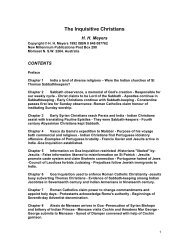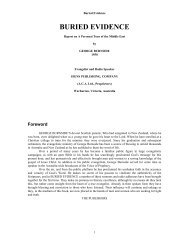Battle of the Bibles - Present Truth
Battle of the Bibles - Present Truth
Battle of the Bibles - Present Truth
You also want an ePaper? Increase the reach of your titles
YUMPU automatically turns print PDFs into web optimized ePapers that Google loves.
day but <strong>the</strong>y have taken on a more vindictive nature by those who wish to uphold<br />
Rome's Bible.<br />
One common charge is that Erasmus was too hasty in his translation which<br />
suffered from a paucity <strong>of</strong> manuscripts. Drummond answers this charge:<br />
"As to <strong>the</strong> charge that Erasmus had been guilty <strong>of</strong> carelessness and dishonesty<br />
in not consulting more than one manuscript, it was simply absurd. He had, in fact,<br />
consulted many in England, in Brabant, and at Basle, and at different times had had in<br />
his hands a greater number than Valla 2 (ibid p 331).<br />
2 "Laurentius Valla, <strong>the</strong> only humanist <strong>of</strong> distinction born in Rome ... He combined<br />
classical with <strong>the</strong>ological erudition and attained an influence almost equal to that enjoyed<br />
by Erasmus several generations later" (Schaff - "History <strong>of</strong> <strong>the</strong> Christian Church", p 595).<br />
To <strong>the</strong> above defence, we could add <strong>the</strong> experience Erasmus had gained while<br />
wandering around Europe and Italy, both in examination <strong>of</strong> manuscripts and in his<br />
discussions with learned classical scholars. Later critics on this score have been more<br />
generous, claiming that Erasmus had only five manuscripts to consult in Basle. But it<br />
seems that even this is an understatement, for Drummond says:<br />
"Erasmus himself, however, seems to say that he used at least nine manuscripts,<br />
as he says in <strong>the</strong> Apologia prefixed to his first edition" (ibid p 311).<br />
But what does it really matter? If Erasmus had researched his project thoroughly,<br />
and <strong>the</strong>n selected one manuscript, it would be <strong>the</strong> one which he considered<br />
representative <strong>of</strong> <strong>the</strong> purest text. Nolan, in his definitive work, "Inquiry", adds his weight<br />
to such a conclusion. He says:<br />
"The two great families <strong>of</strong> Greek <strong>Bibles</strong> are well illustrated in <strong>the</strong> work <strong>of</strong> <strong>the</strong><br />
outstanding scholar, Erasmus. Before he gave to <strong>the</strong> Reformation <strong>the</strong> New Testament in<br />
Greek, he divided all Greek manuscripts into two classes: those which agreed with <strong>the</strong><br />
Received Text and those which agreed with <strong>the</strong> Vaticanus Manuscript" ("Inquiry", p 413).<br />
In connection with this statement, it is here appropriate to observe that <strong>the</strong><br />
manuscripts <strong>of</strong> <strong>the</strong> Received Text Line are also known as <strong>the</strong> Traditional or Majority<br />
Texts, simply because <strong>the</strong>y were traditionally regarded as <strong>the</strong> purest and were<br />
overwhelmingly in <strong>the</strong> majority. Says Wilkinson:<br />
"So vast is this majority that even <strong>the</strong> enemies <strong>of</strong> <strong>the</strong> Received Text admit that<br />
nineteen-twentieths and some ninety-nine one-hundredths <strong>of</strong> all Greek MSS are <strong>of</strong> this<br />
class, while one hundred percent <strong>of</strong> <strong>the</strong> Hebrew MSS are for <strong>the</strong> Received Text" ("Our<br />
Authorised Bible Vindicated", p 13).<br />
It is highly significant that two <strong>of</strong> <strong>the</strong> world's most prominent Christian scholars <strong>of</strong><br />
<strong>the</strong> day, had no problems with Erasmus's New Testament. We refer to Doctors Martin<br />
Lu<strong>the</strong>r and William Tyndale. Instantly <strong>the</strong>y recognised his work as an instrument by<br />
which <strong>the</strong>y could give to <strong>the</strong>ir peoples <strong>the</strong> unadulterated gospel in <strong>the</strong>ir own language.<br />
The reforms planted by Wycliffe, which had lingered, struggling to survive in <strong>the</strong> climate<br />
<strong>of</strong> a defective Bible, were now to burst forth in <strong>the</strong> full power and beauty <strong>of</strong> <strong>the</strong><br />
Protestant Reformation. The world would never be <strong>the</strong> same again.<br />
11





